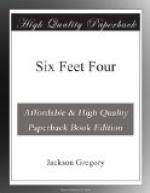It was still about him, intensely still, and black-dark. He stood leaning forward a little, peering into the darkness, listening for a sound, any sound. He knew that it must be half past twelve, that for close upon half an hour he had waited here. Half an hour filled with quick, conflicting thoughts, suggesting a dozen explanations. Was the note really from Miss Waverly? Had she acted in good faith in sending it? What was the danger of which she spoke? Why had she not come, and why had she set an hour like this? Was it a mere hoax?
“If I could only have a smoke,” he muttered, “it wouldn’t be so bad waiting to see what the play is.”
But still he waited, determined not to leave until possessed of the certainty of there being no need of staying longer. Cautiously he approached the house until he could have put out his foot to the first of the steps leading up to the little porch. There he stopped, telling himself that doubtless he was just playing Tom-fool here in his enemy’s garden. Less and less did he like the idea of prowling about the place of Henry Pollard at this time of night.
But now at last there was a sound to vibrate against the empty silence in his ears, a little sound which at first he could not analyse and could not locate. He could hardly be sure whether his senses had tricked him or if he actually heard it. It seemed rather that he had felt it. His body grew very tense as he tried to know where it was, what it was. But again the silence was heavier and more oppressive than before.
At last, through the void of the absolute stillness, it came again. Now he knew what it was although not even yet could he be certain whence it came. It was a cautious step ... it might have been a man’s step or a woman’s. No muscle of his rigid body moved save alone the muscles which turned his eyes to right and left.
At first he thought that there was some one moving toward him from behind, some one who had perhaps just come in through the gate or had been hidden in the straggling shrubbery. And the next instant he knew that the sounds were in front of him, that what he heard was some one walking in the house, tiptoeing cautiously, and yet not silently because the old boards of the floor whined and creaked under the slow tread. Had the night been less still, had his ears been less ready for any sound the faint creak-creak would not have reached him.
“Woman or man?” was his problem. “Winifred Waverly or Henry Pollard?”
There came a second sound and this he recognized; the scraping of dry wood against dry wood, the moving of the bars which the countryside knew that Henry Pollard used as the nightlock upon his doors. Thornton drew back a little, step by step, slowly, silently, and stopped under the pear trees. Now he was ten feet from the first of the front steps, ten feet from the board walk.




